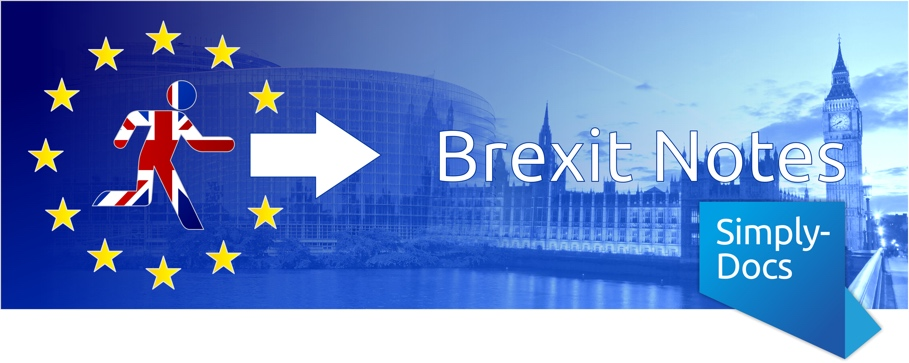No-Deal Brexit
As at the time of writing, the UK is due to leave the European Union on 29 March 2019 (as a result of having served a formal notice under Article 50 of the Treaty on European Union to terminate its membership of the EU), but whether this will be delayed or will take place in a ‘no-deal’ scenario it is still not clear. For the purposes of this post, we assume there will be an exit in a no-deal scenario, but this is a fluid situation that could change rapidly.
General Impact on Contracts of No-Deal
This note looks at the potential impact of a ‘no-deal’ exit on your existing and future commercial sales, purchases, or other contracts. (Note that it does not cover any contracts that you have with consumer customers.) Since contract terms will differ from contract to contract, and the subject matter and circumstances of each contract will also differ, it is impossible to provide any specific guidance or advice. We can, however, highlight some areas that you might need to focus on and so this note concentrates on a few issues that you should be considering.
Consider the Effect of No-Deal on Each of Your Contracts
In relation to an existing or a future contract, you will need to form a view as to whether Brexit might have an adverse impact, and whether that impact might be on you or on the other party to the contract. Whilst Brexit itself will have limited impact on contract law (except in relation to agency and other specialist types of contract), Brexit might have an effect in relation to the parties’ obligations set out in a contract.
Brexit might give rise to greater expense being incurred in order to perform the contract; for example, costs might rise due to new or increased (import or export) tariffs or customs checks applying to trading between the UK and the EU, due to currency exchange rates fluctuating, or due to there being restrictions on the free movement of people. In each case, this could affect the overall costs of buying or selling goods, products, or materials.
Brexit might make it more difficult or even impossible to perform the contract, or it might be that performing it will be commercially unattractive or that it will produce a different outcome from that required or expected by one or both parties. If a party is unable to perform a contract due to Brexit, it could find itself in breach of contract, and, as a result, liable for that breach.
Taking Steps to Mitigate Any Problems
We suggest that you consider firstly those contracts which will still be in existence when Brexit occurs (either on 29 March or any later date on which it is to occur), and secondly, contracts yet to be entered into either before or after it occurs.
Existing Contracts
Taking existing contracts first, if you conclude that a particular contract will be more onerous or expensive due to effects of Brexit, you might decide that you cannot afford to continue with it as it stands, or that, if possible, you would like to mitigate the adverse effects of Brexit on that contract.
What are your options, if any? If the contract has a termination clause allowing you to terminate in stated circumstances which include Brexit, you could use the clause to end the contract, but this will only be an option if the stated circumstances clearly cover Brexit.
You might instead consider renegotiating the contract if the other party is willing to do so.
If they are not, then you would do well to examine the contract to see if it is possible for you to unilaterally take some other step.
If you are seeking to be excused from performance of the contract and your contract includes a ‘material adverse changes’ clause (“MAC”), you might be able to demonstrate that a no-deal Brexit or its effects is an event or amounts to circumstances falling within the terms of the MAC clause, but all will depend on the precise wording of the MAC clause. If in effect you are looking to the MAC clause for relief from financial hardship due to Brexit, you would need to consider whether the MAC clause provides that relief. It might not allow relief where the relevant event (i.e. Brexit) was an anticipated one.
Many contracts contain ‘force majeure’ clauses which excuse performance where it is prevented or delayed by a cause beyond the reasonable control of the party relying on the clause, but it is more likely that you could make use of a MAC clause than a force majeure clause for several reasons.
Unlike a MAC clause, the scope of wording of a typical force majeure clause is confined to a case where it is not possible to perform obligations under the contract, not merely where it is more expensive or onerous to do so. In order to make use of a force majeure clause, a party would first have to show that when properly interpreted it clearly covered a no-deal Brexit, and that it covered Brexit as an event having a permanent, not temporary effect. Furthermore, a typically drafted force majeure clause would only allow reliance on it if a no-deal Brexit were not reasonably foreseen and the affected party could not reasonably have taken steps to avoid the adverse effect of it. It would seem very difficult to argue that Brexit could not be foreseen unless perhaps the relevant contract was entered into many years before it became apparent that it might occur. However, if the effect of Brexit were to make it impossible to perform the contract (a relatively rare case), it might be possible to make use of a force majeure clause. Where the clause does apply, you need to consider what relief it applies, for example, it might suspend the requirement to perform the particular obligation for a period or indefinitely, or it might give a right to terminate the contract.
Where the contract is incapable of being performed, it is possible, but very unlikely, that the doctrine of ‘frustration’ under the law of contract would apply. Where it does apply, the doctrine would have the effect of rendering the contract void. However, it is a very narrow doctrine and for it to apply, it would require the very purpose of the contract to have been removed by the occurrence of Brexit (i.e. the obligations would have to have been transformed by Brexit into something radically different or performance of the contract would have to be commercially sterile) or it would be physically impossible or illegal to fulfil the contract. Further, the relevant event (Brexit) must have been unforeseen by the parties as a possibility at the time of entering into the contract, and not covered by a term of the contract catering for the impact of Brexit. Although context will be important, then, only in quite rare cases will there be ‘frustration’.
Where there is no ‘frustration’ and there is no term written in the contract which helps in the circumstances, is it possible to argue that as a matter of law, a term is to be implied in the contract whose effect is to provide relief against some adverse impact of Brexit on the contract? This is very unlikely given the strict approach that the courts take when interpreting commercial contracts.
Future Contracts
Turning to contracts yet to be signed, if you conclude that carrying out the obligations under a proposed contract would or might be negatively impacted by Brexit, you might first consider the above points about existing contracts. If you reach the conclusion that you need to provide for some relief from certain effects of Brexit, then you would be well advised to include provisions in the contract catering for your needs. For example, you might insert a clause specifically referring to Brexit allowing for rapid termination of the contract upon its occurrence, or dealing with certain stated consequential effects of it. It might provide that no liability will arise from termination, or it might provide for financial adjustments to be made on termination. Alternatively, you might decide to include a MAC clause which states that it comes into play upon Brexit. If relevant, the MAC clause could provide a mechanism to adjust prices where tariff, customs, or exchange rate changes arise from Brexit. You might decide to include a force majeure clause which very specifically deals with Brexit.
It is worth emphasising, however, that the task of identifying what a Brexit clause should cover and then drafting it in a way that is effective to meet the particular requirements identified is not likely to be an easy one.
A possible option might be to enter into only a very short-term contract, but it might only mitigate and not necessarily avoid a problem arising on occurrence of Brexit.
It is also worth bearing in mind that one party (or even both parties) might not accept that Brexit should have any legal effect on the contract or give rise to any relief in relation to obligations under the contract. If that is the case, then, even if nothing in the contract states or suggests that Brexit might have an impact on the contract in any way, it would be prudent to include suitable wording in the contract whose effect is to make clear that Brexit will not have any effect on the contract.
Food for Thought
This is a complex subject, and we can only offer suggestions as to what you might need to address. A Brexit clause in a contract will not solve all Brexit-related problems. Your particular circumstances and the nature, subject matter, and terms of contracts will dictate what you should consider and what you might do, and as always, you should take professional legal advice in relation to existing and future contracts.


